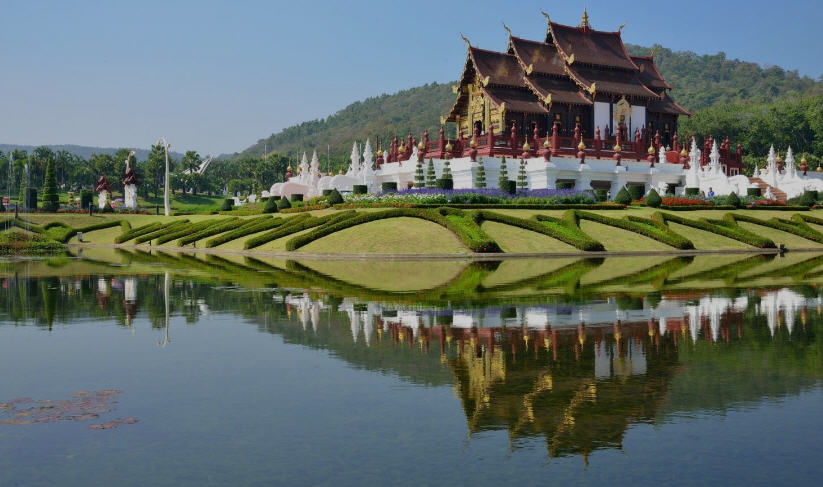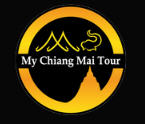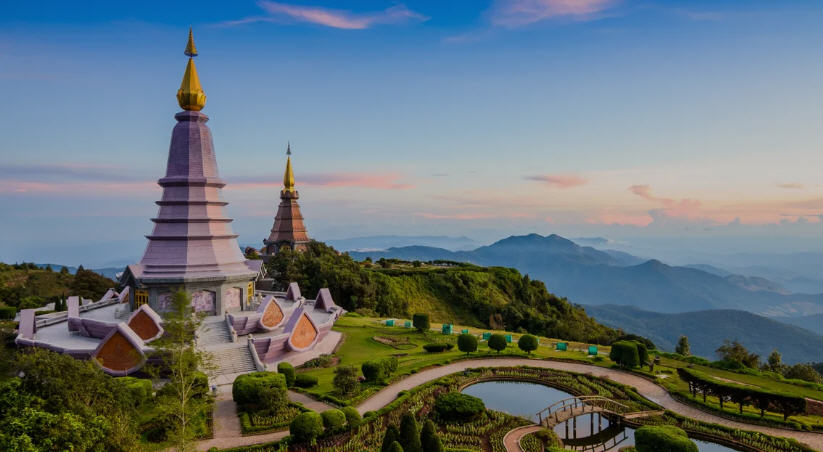
Blog:WGS-B0011
Country:Thailand
City/Region: Chiang Mai
Interest:Culture, Temples, Nature
Best Time to Visit:November to February
Nearest Airport:Chiang Mai International Airport (CNX)
Table of Contents
Chiang Mai night market sounds
Lose yourself in the electric energy of a Chiang Mai night market. Hear the lively hum of bartering, a blend of Thai and English phrases creating a unique soundscape. The rhythmic sizzle of street food vendors fills the air, mingling with the enticing aromas of grilled meats and steaming noodles. Feel the gentle push and pull of the crowd as you explore the kaleidoscope of colorful stalls. The Chiang Mai night market is a vibrant sensory overload, a captivating reflection of the city’s bustling life and rich culture.
Chiang Mai temple bells
Immerse yourself in the spiritual soundscape of Chiang Mai, where the resonating chimes of temple bells create a sense of peace. From grand hilltop temples to hidden neighborhood shrines, the bells’ melodic tones drift across the city. Hear their echoes blend with the soft chanting of monks and the rustling leaves of sacred trees. Let the gentle peal of the bells guide you to a place of tranquility as you explore the rich Buddhist heritage of Chiang Mai.
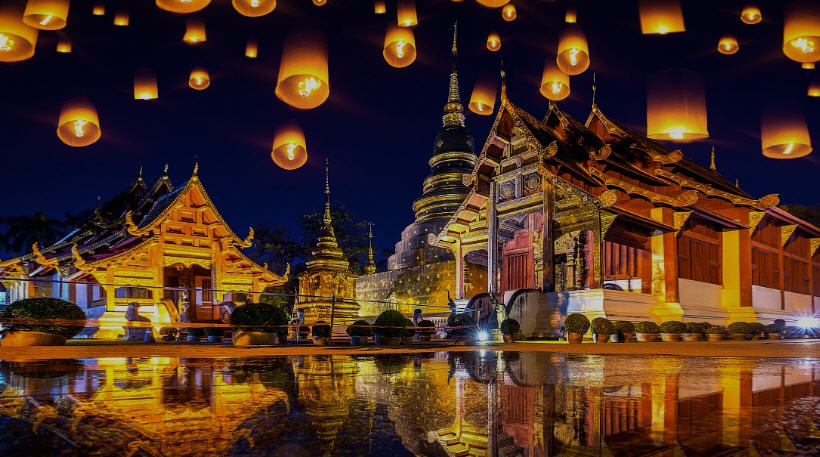

Chiang Mai hidden temples
Escape the bustle of Chiang Mai to uncover its hidden temple gems. Venture down winding alleyways, following the faint scent of incense and the gentle chime of distant bells. Discover a serene courtyard adorned with delicate carvings and golden Buddha statues. Feel the cool, ancient stones beneath your bare feet, their textures whispering of centuries past. Experience the tranquility of these hidden spaces, where the spiritual heart of Chiang Mai beats quietly away from the well-trodden paths.
Chiang Mai Thai massage
Indulge in the healing touch of a traditional Thai massage in Chiang Mai. Feel the expert hands of your masseuse knead away muscle tension, easing aches and stiffness. Let the gentle stretching and rhythmic pressure points release energy blockages and enhance flexibility. Breathe in the delicate aroma of herbal oils and listen to soothing music, enhancing the feeling of relaxation. Experience the rejuvenating power of Thai massage, where skilled techniques and mindful attention leave you feeling revitalized in body and mind.
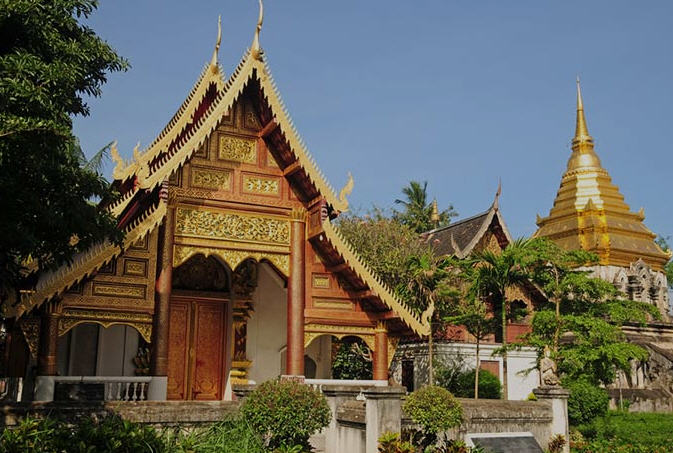
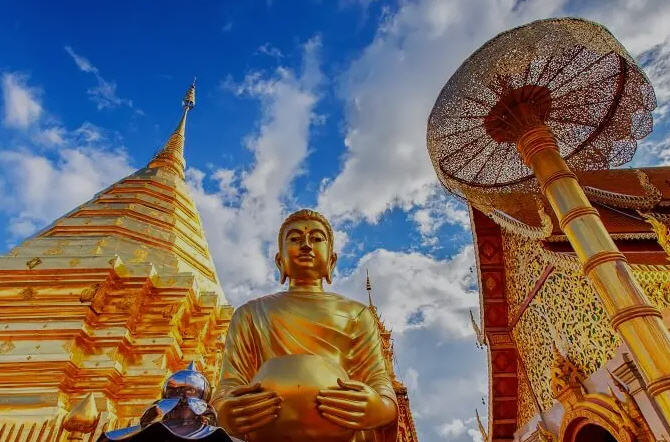
Chiang Mai elephant sanctuary
Embark on an ethical encounter at a Chiang Mai elephant sanctuary, where respect and care for these gentle giants is paramount. Feel the rough, wrinkled texture of an elephant’s skin as you offer a handful of bananas. Hear the joyful trumpets and rumbles as the elephants interact with each other. Splash playful elephants with water from a nearby stream, their delighted snorts and splashes filling the air. Experience the bond between human and animal in a responsible setting, creating unforgettable memories and promoting elephant welfare.
Chiang Mai flower market smells
Step into the intoxicating world of a Chiang Mai flower market, where the air is filled with a symphony of floral fragrances. Breathe in the sweet, heady aroma of jasmine, a timeless scent of Thailand. Delight in the delicate perfume of orchids, their exotic blooms matched by their exquisite scent. Catch hints of roses, lilies, and countless other blooms, creating a kaleidoscope of olfactory delights. The Chiang Mai flower market is a feast for the senses, a fragrant reminder of the region’s natural beauty.
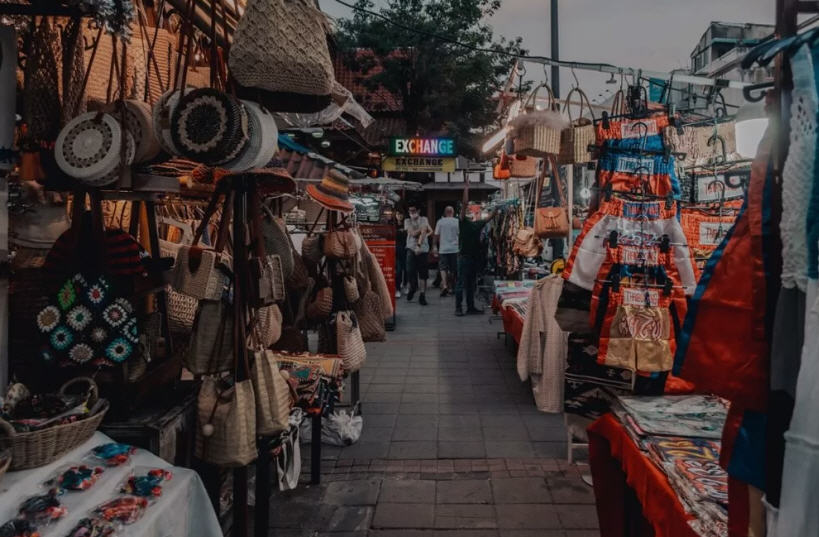
Chiang Mai cooking class experience
Immerse yourself in the vibrant flavors and techniques of Thai cuisine with a Chiang Mai cooking class. Hear the rhythmic chop of vegetables and the sizzling of spices in a hot wok. Breathe in the intoxicating aroma of chili, lemongrass, and fresh herbs, their fragrance awakening your palate. Savor the complex flavors of your creations, a balance of sweet, salty, sour, and spicy. Let the sounds, smells, and tastes of a Chiang Mai cooking class transport you to the heart of Thai culinary culture.
Chiang Mai Doi Suthep sunrise
Ascend Doi Suthep at dawn and witness a breathtaking Chiang Mai sunrise. Feel the cool, damp air on your skin as darkness gives way to the first rays of light. Listen to the gentle rustling of leaves stirred by a morning breeze and the distant chanting of monks echoing from the temple. Watch as the first golden rays illuminate the city below, painting the landscape in a warm glow. Experience the peaceful transition from night to day, a rejuvenating moment of natural beauty.
Things To Do
- History Buff: delve deeper into Lanna history at the Chiang Mai National Museum, explore ancient city gates, and witness the coronation ritual at Wat Phra Singh.
- Thrill Seeker: conquer rapids on the Mae Taeng River, go zip-lining through the jungle canopy, or cycle through picturesque rural landscapes.
- Nature Lover: embark on a sunrise hike to Wat Pha Lat temple, visit the stunning Huay Tung Tao Lake, or take a boat trip down the Ping River.
- Culture Vulture: attend a traditional Khantoke dinner with Lanna dances, learn to cook local delicacies, or participate in a monk chat at Wat Chedi Luang.
Nearest Airport and Best Time to Visit
Nearest Airport: Chiang Mai International Airport (CNX)
Commute:
- Songthaews (shared taxis) and tuk-tuks are readily available within the city.
- Renting a motorbike or bicycle offers flexibility for exploring nearby areas.
- Grab (Southeast Asian ride-hailing app) provides convenient transportation options.
Best Time to Visit:
- November to February: Coolest and driest weather, ideal for outdoor activities.
- February to April: Warmer temperatures, blooming flowers, vibrant Songkran festival (Thai New Year).
- May to October: Rainy season, lush landscapes, fewer crowds.
Remember: Respect local customs and dress modestly while visiting temples. Consider sustainable tourism practices and support responsible businesses.
With this guide, embark on your Chiang Mai adventure and discover the city’s captivating blend of culture, stunning natural beauty, and unforgettable experiences.
Want to get in touch with us?
Questions you might have for this Blog
Feel free to ask questions.
General Questions:
If you have noticed any information that is not accurate, please let us know.
An Advertiser:
Your ads will be in the section below “Ads for Businesses”. Please also refer to the Subscription Plans tab.
For ads we would prefer your website presence where you would maintain your B2B price, deals or promotions etc. A control number link will connect to advertisers website.
Book Air and Hotel (Check for deals in our Ad Section below)

Travel Insurance

- InsureMyTrip : (https://www.insuremytrip.com/) This is a well-known online platform that allows users to compare and purchase travel insurance from various providers.
- TravelGuard https://www.travelguard.com/) TravelGuard is a reputable company that offers comprehensive travel insurance plans and is often cited as a reliable source for purchasing travel insurance.
- Squaremouth https://www.squaremouth.com/) Squaremouth is an authoritative website for comparing travel insurance policies and obtaining quotes from different providers, making it a valuable resource for travelers seeking coverage.
Business Ad Section - This may include deals or promotions.
Chiang Mai History
Founding and the Lanna Kingdom (13th – 18th centuries)
- King Mangrai (1296): King Mangrai of the Tai Yuan people founded Chiang Mai (“New City”) as the capital of the Lanna Kingdom.
- Strategic Location: Situated along trade routes and near the Ping River, Chiang Mai became a center of power, commerce, and Buddhism.
- Golden Age: Under kings like Tilokaraj, Lanna flourished. Temples were built, art and literature prospered, and strategic alliances were formed.
- Wars and Decline: Chiang Mai was frequently caught in conflicts with neighboring kingdoms, particularly the Burmese.
Burmese Rule (16th – 18th centuries)
- Occupation (1558): King Bayinnaung of Burma conquered Chiang Mai, leading to two centuries of Burmese rule.
- Depopulation and Neglect: Chiang Mai suffered significant decline during this period, with its population dwindling and many temples falling into disrepair.
Revival and Integration into Siam (18th – 20th centuries)
- Kawila’s Rebuilding (1774): With the help of Siam (Thailand), Prince Kawila expelled the Burmese and began rebuilding Chiang Mai.
- Gradual Integration: Chiang Mai became a semi-autonomous tributary state within Siam. Over time, its independence waned as Siam’s power centralized.
- Early Modernization (late 19th/early 20th centuries): Siamese reforms, the arrival of missionaries, and the opening of the railway line (1922) brought significant changes to Chiang Mai.
Modern Chiang Mai
- Cultural Hub: Chiang Mai has retained its unique identity; a blend of Lanna traditions with modern Thai influences. It is known for its numerous temples, vibrant festivals, and arts scene.
- Tourism Boom: Chiang Mai rose as a major tourist destination, renowned for its natural beauty, historic sites, and relaxed atmosphere.
- Balancing Growth and Preservation: Chiang Mai navigates the challenges of rapid development while aiming to preserve its cultural heritage and stunning surroundings.
Key Points to Consider
- Temple City: Chiang Mai’s history is inseparable from Buddhism. Its hundreds of temples reflect the city’s deep spiritual roots.
- Crossroads of Influence: Centuries of conflict and cultural exchange have shaped Chiang Mai, leaving a mix of Lanna, Burmese, and Thai influences.
Resources for Exploration
- UNESCO Tentative List – Chiang Mai: https://whc.unesco.org/en/tentativelists/6003/
Some interesting facts
Chiang Mai (meaning “new city” in Thai) was founded in 1296 as the new capital of Lan Na, succeeding the former capital, Chiang Rai. The city’s location on the Ping River (a major tributary of the Chao Phraya River) and its proximity to major trading routes contributed to its historic importance.
The historical capital of the old Lanna Kingdom, Chiang Mai is rich in culture. The Old City – an attraction in itself – hosts most of the best temples, museums and other interesting sites, with many more just outside the ancient city walls and moat.
Chiang Mai was purposefully created by King Mangrai in AD. 1296 to be the political, economic, social and cultural center of his newly expanded and integrated kingdom of the Tai people, called “Lanna Kingdom” (kingdom of a million rice fields).
Undoubtedly, the rich architecture of Buddhist temples are one of the major reasons why we love Chiang Mai so much. There are more than 300 temples in Chiang Mai. It feels like a town full of only temples, like Kajuraho in India. So, it’s quite difficult to choose a few of them to visit.
Rose of the North
In northern Thailand, which had been the independent kingdoms of Lan Na and Chiang Mai from 1259-1939, a distinctive form of Thai is still spoken by the Local inhabitants, all of whom can also speak central Thai. All variants of Thai use the same alphabet.
